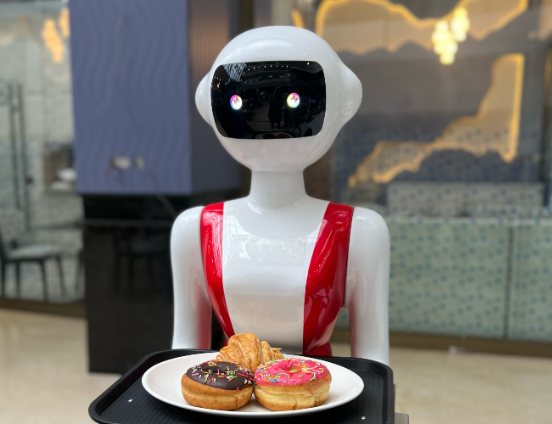- The robots' capabilities extend beyond mere service; they utilize self-driving technology and AI-powered obstacle avoidance to navigate the restaurant's layout seamlessly.
In the bustling heart of Nairobi's Kilimani neighbourhood, a new era has dawned for the service industry – one that has sparked a heated debate among Kenyans on social media. At the Nana Plaza Complex along Oloitoktok Road, a hotel has unveiled a groundbreaking concept: a Robot Café, where automated waiters greet customers with warm, onscreen smiles, signalling the rise of technology in the dining experience.
This innovative establishment is part of a global trend, as automated restaurants have been gaining traction in first-world countries such as China, the USA, Germany, and Japan. Now, Kenya has joined the ranks of nations embracing this robotic revolution, much to the chagrin of many citizens.
"Whatever occasion that you have, they will come sing to you. They also take food to the designated tables, where customers pick the food from there," explains John Wangoi, the manager of this pioneering café.
The robots' capabilities extend beyond mere service; they utilize self-driving technology and AI-powered obstacle avoidance to navigate the restaurant's layout seamlessly. This level of automation not only enhances the dining experience but also highlights the rapid advancements in robotics and artificial intelligence.
However, the introduction of these automated waiters has been met with a chorus of concern from Kenyans on social media, who fear the impact this technology may have on traditional job opportunities, particularly for those working as waiters and waitresses.
"As automation progresses, Kenyans, more so the youths, should anticipate a reduction in traditional job opportunities. It's therefore crucial to focus on acquiring new skills and embracing adaptability to excel in an evolving job market shaped by technological advancements," warns @itshalahia on X.
Others, like @KNUdigital, argue that such technological advancements should be left to "developed countries" and that Kenyans should not be "the ones to try it."
The debate over the societal implications of the Robot Café is not lost on the management. "If food is not the one you ordered, would one ask the robot why?" ponders @makansimon, raising questions about the human touch in customer service.
As the Robot Café at Nana Plaza continues to attract curious diners, the underlying concern among Kenyans on social media is palpable. The success or failure of this pioneering venture may serve as a harbinger for the country's readiness to embrace the robotic revolution while highlighting the need to address the potential displacement of traditional service industry jobs.












